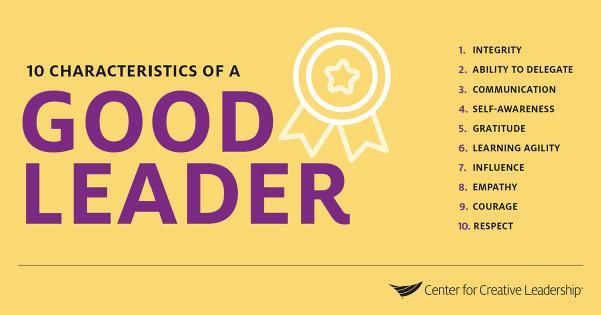
2 minute read
Activity 1: Introductory Activity
Great role models know they have to have a consistent message and business plan, and repeat it over and over again until everyone understands.
4. Show respect and concern for others. You may be driven, successful, and smart, but whether you choose to show respect or not speaks volumes about how other people see you. Everyone notices if you are taking people for granted, not showing gratitude, or stepping on others to get ahead.
5. Be knowledgeable and well rounded. Great role models aren’t just “teachers.” They are constant learners, challenge themselves to get out of their comfort zones, and surround themselves with smarter people. When team members see that their role model can be many things, they will learn to stretch themselves in order to be successful.
6. Have humility and willingness to admit mistakes. Nobody is perfect. When you make a bad decision, let those who are watching and learning from you know that you made a mistake and how you plan to correct it. By apologizing, accepting accountability, and correcting course, you will be demonstrating an often overlooked part of being a role model.
7. Do good things outside the job. People who do the work, yet find time for good causes outside of work, such as raising money for charity, saving lives, and helping people in need get extra credit. Commitment to a good cause implies a strong commitment to the business.
True role models are those who possess the qualities that we would like to have, and those who have affected us in a way that makes us want to be better people. They help us to advocate for ourselves and take a leadership position on the issues that we believe in.
The characteristics of a good leader
1. Integrity
The importance of integrity should be obvious. Though it may not necessarily be a metric in employee evaluations, integrity is essential for the individual and the organisation.
It’s especially important for top-level executives who are charting the organisation’s course and making countless other significant decisions. Our research shows that integrity may actually be a potential blind spot for organisations. Make sure your organisation reinforces the importance of integrity to leaders at various levels.
2. Ability to Delegate
Delegating is one of the core responsibilities of a leader, but it can be tricky to delegate effectively. The goal isn’t just to free yourself up — it’s also to enable your direct reports, facilitate teamwork, provide autonomy, lead to better decision-making, and help your direct reports grow. In order to delegate well, you also need to build trust with your team.
3. Communication
Effective leadership and effective communication are intertwined. You need to be able to communicate in a variety of ways, from transmitting information to coaching your people. And you must be able to listen to, and communicate with, a wide range of people across roles, social identities, and more. The quality and effectiveness of communication across your organisation directly affect the success of your business strategy, too. Learn how better conversations can actually improve your organisational culture.







